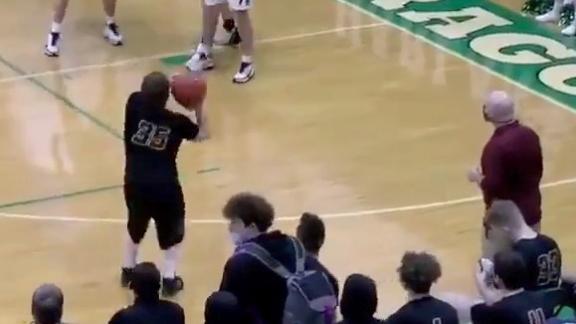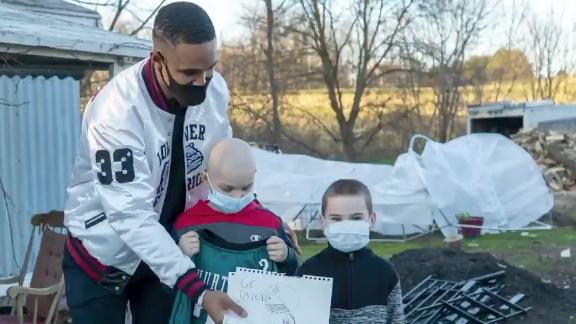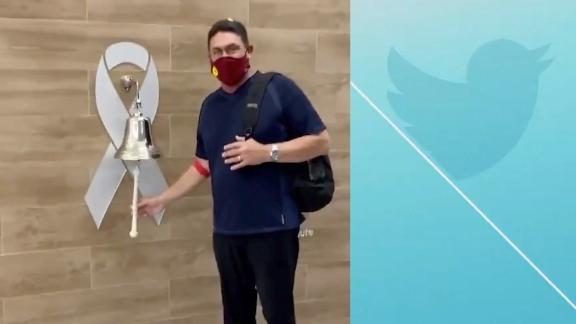"I'm not a jock, just know that," says Tanner Hall.
The freeskiing pioneer and seven-time X Games gold medalist is eating tacos in the middle of the afternoon at a dimly lit Mexican restaurant in Truckee, Calif. He's just finished a trampoline session and workout at nearby action sports training facility Woodward Tahoe, part of his early-winter preparation for this year's freeskiing contest season.
For a self-proclaimed non-jock, Hall looks surprisingly strong -- 160 pounds of lean muscle, big enough to take hits in the halfpipe without flinching. His forearm tattoos peek out from under his shirt, and his flat-brimmed hat is stamped with the logo of his new energy drink sponsor, Rockstar Energy. This is a new Tanner Hall I'm looking at across the table.
In 2010, he was weaker and weighed 20 pounds less, was suffering from an addiction to pain medication, and had two severely damaged knees following a near career-ending injury the previous year. He had a chip on his shoulder, and his reputation at the time reflected that. But now, in addition to his regained physical strength, he has a new state of mind, a mental toughness, and a sense of humility and appreciation for what he has.
"He's a completely different Tanner than he was five years ago," says Dr. Vern Cooley, Hall's longtime orthopedic surgeon and a physician for the U.S. ski team. "He used to be a wild guy who didn't take care of himself and had a sense of arrogance. But now, he's dedicated and focused. His injury helped him grow up."
Hall agrees. "My life changed after that injury," he says. "Before, I was getting out of control with my partying and my lifestyle. I wasn't being healthy. I wasn't treating my friends and family the way I should. I think karma put me in my place."
After the injury, doctors told him he would never ski in the halfpipe again. He set out to prove them wrong. "When you have something you love so much taken away from you, you realize what matters in life and who's there for you and who's not," Hall says. "I'm not saying I'm perfect. That's never been me. But when I set my mind to do something, I do it to the fullest."
Against all odds, Hall will do what doctors told him he'd never do again: He will compete at X Games Aspen for the first time since his knee injuries in 2009. This week, he was given the coveted invite to the event, which will be held Jan. 24-27 in Aspen, Colo. Hall has a decent chance to get back on the podium, but for him, that's not what matters anymore.
"What do I have to prove? I'm 29, and I'm going to be competing against kids who are 16," Hall says. "But X Games has always been a good contest, and I'm just going to love my life because I'm blessed with the opportunity to get back in that start gate. Win or lose, no matter what, I've come this far, and I've gotten myself back into fighting form."
Hall has devoted almost half of his 29 years to freeskiing. At age 15, he left his home in Kalispell, Mont., to attend a private ski academy in Park City, Utah, to focus on mogul skiing. By 16, he'd been kicked out of high school and he'd given up moguls for the more counterculture world of freeskiing. He was a natural from the start.
In 2001, at 17, he competed in his first X Games and won gold in Ski Big Air. In 2008, he became the first person to three-peat in two Winter X disciplines by earning three straight Ski SuperPipe and Ski Slopestyle victories.
Since then, Hall has been a prominent player in the freeskiing world. He became an investor in a cat-skiing operation in British Columbia, Canada, co-founded the ski company Armada, and he's appeared in over a dozen ski films, including a 2011 documentary about his life called "Like a Lion," created by his friends and filmmakers Eric Iberg and Shane Nelson.
"Tanner's contribution to freeskiing can't be overstated," says Chris Jerard, a co-founder of the Association of Freeskiing Professionals. "From winning X Games gold to coming back from devastating injuries that would have crippled someone else, he has always found a way to win with skiing. The advantage is his deep love of the sport combined with a crazy mental toughness. The truth is, the only one who can beat Tanner … is Tanner."
Hall suffered a major injury in March 2005, when he broke both heels and both ankles in a crash at Utah's Chad's Gap, but he came back strong after that, seemingly unstoppable. He won the next three X Games Ski SuperPipe golds.
All of that success came to an abrupt end in May 2009. Hall, then 26, massively overshot the landing of a jump while filming with Teton Gravity Research at Stevens Pass, Wash. He broke both of his tibial plateaus, tore the anterior cruciate ligaments in both of his knees and suffered severe articulate cartilage damage in his right knee.
"For most people who suffer that type of injury to just one of their knees -- let alone both of them -- it would be career ending," says Cooley. "I told Tanner, it might be time to focus on other aspects of skiing besides competing."
After multiple surgeries to repair the injuries, Hall was relegated to a wheelchair, followed by months of physical therapy and rehabilitation. He traveled to Mexico for a controversial drug treatment called prolotherapy, which he claimed helped, but he says he was still in severe pain almost constantly. It was during this time that Hall hit a low point. He turned to alcohol and drugs as an escape, and he soon found himself in a spiraling addiction to prescription pain medication.
"When you have an injury like that, you want pain medication and you can get it," Hall says. "My doctor saw how much pain I was in. I'd come into his office in tears. The pain meds helped at first. But then, when I should have stopped taking them, I started taking more and more. It was a rough time. That high gave me an escape. At first, it's a high you think you like. But after a while, people started looking at me like I was a zombie."
Tanner's friends, including his business partner Iberg, the late freeskier C.R. Johnson and others, tried to talk him out of it. He denied having a problem. "At first, I was embarrassed," Hall says. "I didn't admit it. I was like, 'I don't know what you're talking about, I'm getting better.'"
Ultimately, Iberg gave Hall an ultimatum. "Quit the drugs or I'm walking away," Iberg told Hall in the winter of 2010, just a few weeks after Johnson died in a ski crash. "That was a real eye opener," Hall says. "So I quit. And man, was it painful."
After a year and a half of taking excessive pain medication, Hall spent weeks with symptoms of withdrawal. "You can't explain the pain unless you've gone through it," he says. "I thought I had a broken back from the pain, and the headaches were so bad. It was really terrible. But after a few weeks, I started feeling a little better. I started to see a light at the end of the tunnel."
His friends and family stood by him throughout it. "Tanner was not himself when he was at his lowest. He was not in control," says Iberg. "But when he was able to kick the alcohol and drugs, he got control back of what he wanted in his life -- and that was skiing."
In 2014, ski halfpipe, along with ski slopestyle, will make its Olympic debut in Sochi, Russia. When that news broke in April 2011, Hall figured he'd never have a chance to compete in the Olympics.
He was still in pain and had little range of motion in his knees. He couldn't even click into his ski bindings while standing up.
In June 2011, Hall walked into the U.S. Ski Team's Center of Excellence in Park City, Utah, a training facility for American ski and snowboard athletes. It was there that he met Jessica Tidswell, a physical therapist and athletic trainer who worked with the U.S. Ski and Snowboard Association for more than five years. (She now works exclusively with Hall.)
Tidswell told him that he could make himself better, that he didn't have to ski through the pain. Together, they worked to build Hall's stability, strength and range of motion. He spent five hours a day in the gym. "Tanner has been working his butt off," says Tidswell. "He's 29 and he's coming back from an orthopedic history that would buy an orthopedic surgeon six Porsches, but he's put in the work and that's what makes him a champion."
After one year of rehabbing with Tidswell, Hall became a champion again -- literally. In August 2012, just days after getting dropped by his longtime sponsor Red Bull, he returned to his first halfpipe contest in three years, the New Zealand Freeski Open. On a stormy day at Snow Park NZ, Hall trumped a stacked field -- including Jossi Wells, Torin Yater-Wallace, Benoit Valentin and others -- to win his first halfpipe contest back on snow.
"I just threw a run that I was confident with," he says. "I went to have fun. I wasn't expecting anything. But when you're having fun, the medals come."
Right now, Hall is currently ranked 14th on the Association of Freeskiing Professionals' men's halfpipe rankings.
"Tanner beat the odds," said Cooley.
Added Iberg, "Tanner is now stronger than ever, both mentally and physically. Now, Tanner is on a mission."
That mission includes a return to the very event he once dominated: the X Games. Hall didn't compete last weekend at the U.S. Grand Prix at Copper Mountain, Colo., a qualifying contest for the 2014 Olympics, because he was in British Columbia filming his part for the upcoming "X Games Real Ski Backcountry," a film contest that will debut at X Games Tignes in March (Hall is one of eight invited skiers). Despite his absence, Hall's early-season results were enough to secure his spot in Aspen, according to Chris Schuster, ski sport organizer at the X Games.
In Aspen, he will be one of the oldest competitors in the freeskiing field, but that experience, he says, "will give him an edge." It's the same mental toughness he's been accruing for years.
"No matter if I'm competing against kids who are 16, and I'm 29. In contests, I look at how stressed people are and I just have a smile on my face because when I see that look of nerves, I think, 'You're done, because I'm going to eat you alive,'" Hall says. "I like to stir the pot. People may think I'm a jerk in life. People like the guys with the Wally Cleaver image, like Bobby Brown and Nick Goepper, and that's fine; those are great kids. But that's not me. Never has been and never will be."
"Tanner brings a charisma and an energy to the halfpipe that might have been a bit lacking in the past few years without him," says Hall's agent, Tom Yaps. "I can't wait to see him back in the pipe in Aspen, where he's had so many memorable showdowns."
With any luck, Hall's mission may also include a trip to Sochi, Russia, in 2014, but he remains realistic. "I'm not saying I'm going to the Olympics and I'm going to win everything," he says. "It's a goal of mine to get there and have as much fun as possible, but if I don't get there, I don't care."
We're still sitting at the Mexican restaurant, the tacos long gone. The sun is beginning to set on the early-winter afternoon. "What do you care about, then?" I ask him.
"What I care about is being able to click into my skis for the rest of my life," he says. "I care about being on top of the mountains with my best friends. If I'm on my skis, I've got a big smile on my face. And I want to keep it that way."




